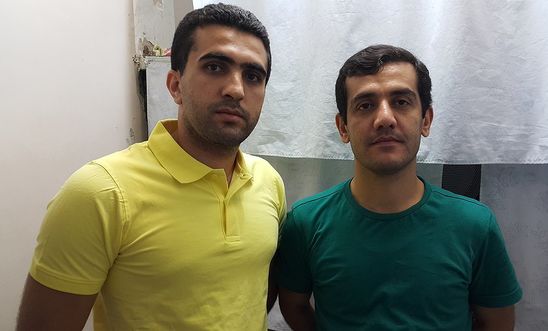
Press releases
Iran: Kurdish cousins face imminent execution despite torture allegations

Zaniar Moradi (l) and Loghman Moradi (r) gave supposed ‘confessions’ to Press TV after alleged beatings and rape threats
Their trial lasted only 20 minutes
‘This is textbook Iranian “justice”’ - Philip Luther
The Iranian authorities must immediately halt the planned execution of two Iranian ethnic minority Kurds who allege they were tortured into making bogus “confessions”, Amnesty International said today.
Cousins Zaniar Moradi and Loghman Moradi, who could be executed as early as tomorrow, say they “confessed” to murder after being tortured - including by being punched, kicked, and tied to a bed and flogged - as well as being threatened with rape. The two men were also held for nine months without access to their lawyers and families following arrest in 2009.
Their request for a judicial review of their case has been repeatedly ignored by the authorities.
The pair have spent the last eight years on death row after being sentenced to public hanging. Two days ago, they were moved from the general ward of Raja’i Shahr prison in the city of Karaj, north-west of Tehran, to solitary confinement cells in the prison.
Yesterday, the prison authorities phoned the two men’s families, telling them to visit their detained relatives, sparking fears their executions were imminent.
The cousins have repeatedly denied the accusations against them, maintaining that the Ministry of Intelligence has targeted them in retaliation for the activities of Zaniar Moradi’s father, Eghbal Moradi, a prominent political dissident who was assassinated in July this year. Eghbal Moradi was a former member of the Komala Party of Kurdistan, a banned Iranian Kurdish opposition group based in Iraq’s Kurdistan Region, and a member of the Kurdistan Human Rights Association.
The Moradi cousins were arrested by Ministry of Intelligence officials on 1 August 2009 and 17 October 2009 respectively in the city of Marivan, Kurdistan province, and accused of the murder of the son of a senior cleric. They were held without access to their families or lawyers for the first nine months of their detention. During this time, they said they were forced to “confess” to the murder in front of a video camera after being tortured. Their forced “confessions” were then broadcast on a programme aired on the state television channel Press TV in early November 2010, before their trial had even taken place.
In December 2010, after a trial that lasted just 20 minutes, Branch 15 of the Revolutionary Court in Tehran convicted them of “enmity against God” and murder. Their lawyer has told Amnesty that the only evidence against them was their forced “confessions”.
Philip Luther, Amnesty International's Middle East Research and Advocacy Director, said:
“This is textbook Iranian ‘justice’.
“Two men are facing imminent execution after being sentenced to death on the basis of ‘confessions’ tainted by torture allegations. Despite the seriousness of the charges against them, their grossly unfair trial lasted just 20 minutes.
“We urge the Iranian authorities to immediately halt any plans to execute these men, to quash their convictions and sentences, and to order a new trial in proceedings that are in line with international fair trial standards. They must also investigate their torture claims and bring anyone found responsible to justice.”
Another Kurd on death row in Raja’i Shahr prison
Amnesty is calling on the Iranian authorities to reveal the fate and whereabouts of another Iranian Kurd, Ramin Hossein Panahi, who is also on death row in Raja’i Shahr prison and at imminent risk of execution. Panahi, who was sentenced to death this January, sewed his lips together and started a hunger strike on 26 August in protest at his death sentence and ill-treatment. He was immediately removed from the prison’s general ward and has not been heard from since.
Amnesty opposes the death penalty in all cases without exception regardless of the nature of the crime, the characteristics of the offender, or the method used by the state to kill the prisoner. The death penalty is a violation of the right to life.